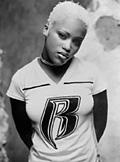Though it wasn’t in the televised part of the show last Wednesday, Eminem’s winning two rap Grammy awards certainly qualifies as some form of spectacle. Relatively fresh to the scene, Eminem probably did have the best year of any major-label rapper—instant MTV acceptance, a multi-platinum album, heaps of underground respect for his earlier work, and all without getting arrested a single time (though he did pummel a heckler at a San Francisco show and does lose points for getting sued by various family members). Regardless, none of those factoids truly capture the essence of his victory. Imagine for a moment the National Academy of Recording Arts and Sciences (NARAS) voters—old-school rock ‘n’ roll types who know about as much about hip-hop as they do about polka. This is not a body known for its diversity—musical, racial, or otherwise. Thus, when faced with the rap nominees, they look in the mirror and go with strength: The white boy rides again!
The shame of this is, of course, that among this year’s nominees Eminem may well have been the best choice based on talent alone. In the Best Rap Solo Performance category, “My Name Is” was up against a generic Busta Rhymes single, another dead track from 2Pac, Q-Tip’s re-vivr-al, and Will Smith’s obligatory nod (which I can only imagine didn’t win due to its above-and-beyond-the-call-of-duty wackness—even the rock guys were like “This blows! That cowboy shit is played!”). For Best Rap Album, Slim Shady fended off Busta Rhymes, Missy Elliott, Nas, and the Roots. It’s an easy victory over the first three of that set: a) is anyone actually listening to Busta Rhymes albums anymore?; b) Missy’s cool, but this set was such a slow build that it was all but forgotten before it was remembered; and c) somehow, after selling out completely both in his music and in his lifestyle, Nas still can’t afford charisma—he’s the world’s largest, suckiest underground MC.
It’s only the Roots who gave Eminem a run for his nookie, though they were redeemed with a shocking victory in the third and final rap category, Best Performance by a Duo or Group. Apart from the third irrelevant Busta nomination, “You Got Me,” the Roots’ divine collaboration with Erykah Badu, faced formidable competition from Puff Daddy (now too thugged out for Grammy voters), Dr. Dre with Snoop, and Eminem with Dr. Dre. The victory came as such a profound surprise (after Moby’s crack about the Roots “theoretically” being the winners, I kept fearing Serena Altschul would pop up on MTV News that night and say it was all a big misunderstanding), it’s enough to make me reevaluate my reservations about the whole Grammy process.
But not so fast. It’d be easier to do so if, historically, NARAS hadn’t displayed such considerable ineptitude in its relationship with rap music. Rap has been a part of the Grammys for just over a decade, with the first award having been issued at the 1989 ceremonies. At that time, rap had already demonstrated its commercial viability and had been feted on the rival awards telecast, the American Music Awards. The nominees that year leaned more to the commercial side of the genre—DJ Jazzy Jeff & the Fresh Prince, LL Cool J, Kool Moe Dee, J.J. Fad, and Salt & Pepa; however, as a new and relatively obscure category, it was deemed not integral to the telecast itself and slotted for the pre-ceremonies (as are most categories—this year, only about 25 of the over 90 awards aired on the broadcast).
It being the beginning of rap’s political era, this insult sparked a furor in the hip-hop community. Bill Adler, then chief publicist for Def Jam’s management arm, did the unthinkable, coordinating a boycott of the Grammys by the nominees (except Kool Moe Dee, who “represented” hip-hop on the broadcast to general ridicule in the rap world). Will Smith (yup, the Fresh Prince) even gave up his performance slot to express his distaste in militant fashion. Says Adler, “It was very distressing to us. These were powerhouse years for hip-hop, and they weren’t treating us properly.”
Despite the protest, the rap category went untelevised, though that was rectified in later years as rap’s commercial power increased exponentially. In true Grammy fashion, though, innovators like A Tribe Called Quest, De La Soul, Ice Cube, Wu-Tang Clan, and others were ignored by the voters in favor of one-hit wonders like Coolio, Young MC, Sir Mix-A-Lot, and Arrested Development—more often than not, the Grammy is a one-way ticket to triviality. All of this, naturally, makes me fear that the Roots, and even Eminem, may also be consigned to one-hit wonderdom in the history books—simultaneously recipients and victims of the recording industry’s highest honor. Kinda makes you root for Will Smith after all.
Slanguistics, Seattle Weekly‘s new hip-hop column, will appear in this space every other week unless something bad happens.








